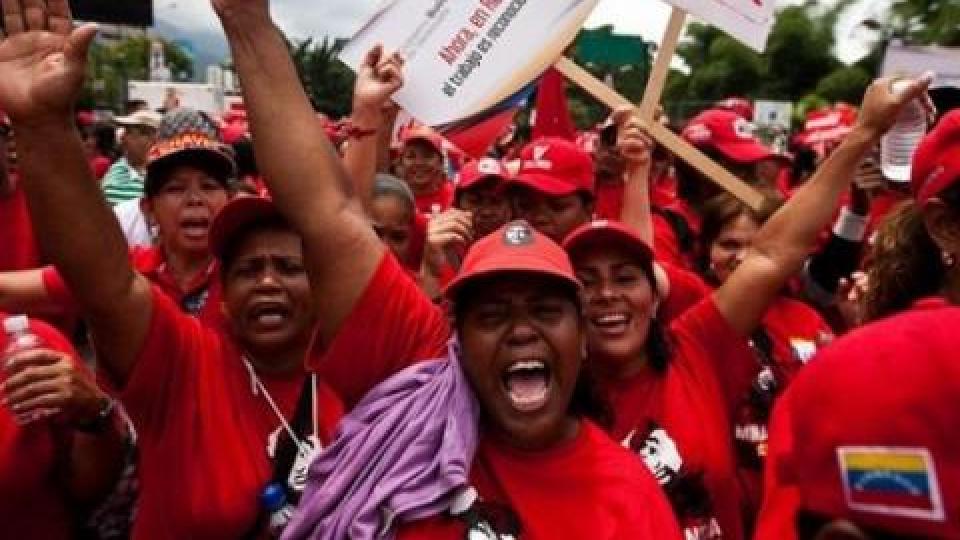Venezuela: Solidarity needed to defeat counter-revolution

In the face of ongoing attempts to violently depose the elected government of President Nicolas Maduro, the Socialist Alliance reaffirms its support and solidarity with the Venezuelan people, their government and the Bolivarian revolution.
Contrary to claims by the corporate media and right-wing governments in the region, Venezuela is not witnessing a peaceful protest movement for democracy but rather its opposite: a counter-revolutionary wave of violence that seeks to provoke greater bloodshed, and potentially, an international intervention.
The recent wave of violent protests that began in early April is just the latest in a long string of attempts by Venezuela’s right-wing opposition to roll back the gains of the pro-poor Bolivarian revolution.
The revolution has its origins in the popular anti-neoliberal revolts of the ’80s and ’90s and that began to dislodge the corrupt, right-wing political class from power with the election of Hugo Chavez in 1998.
Since then, opposition destabilisation attempts include:
A combined bosses lock-out that attempted to shut down the economy in December 2001;
A military coup in April 2002;
A two-month shutdown of Venezuela’s oil industry between December 2003 and January 2003;
Weeks of violent street protests – known as guarimbas – in February-March 2004 that left nine dead;
Violent guarimbas following Maduro’s victory in the 2013 presidential elections that left seven dead; and
Several weeks of violent guarimbas that left over 40 dead in February-March 2014.
Each of these attempts have been spearheaded by the same political and economic elites that have seen their class interests and power affected by the actions of the Chavez and Maduro governments and that today are calling for Maduro’s ouster.
Under the guise of fighting for “democracy” and against “authoritarianism”, this minority has sought to use violence and undemocratic measures to nullify the consistent majority votes that the Bolivarian forces have achieved in all but two of the numerous elections that have taken place in Venezuela since 1998.
This time around, the right-wing opposition hopes to use two important factors to tilt the situation in their favour.
The first is the shift in the regional balance of forces that has occurred following the right’s return to power in countries such as Argentina and Brazil (where a constitutional coup removed an elected president). Along with this, we have seen the increasingly hostile attitude taken by Organisation of American States (OAS) secretary general Luis Almagro, who has attempted to lead a regional campaign against Venezuela. The opposition expects to use this international pressure to isolate Venezuela, and if necessary provoke a foreign intervention in the country.
The second is the effects of the ongoing economic war against the government that, together with the impact of the drop in oil prices and certain errors in government economic policy, is the main reason for the shortages in basic goods and spiralling inflation. The opposition hopes that this situation may help them win support among the poor majority that make up the revolution’s base and ultimately turn them against the government.
In all this, the corporate media has played a critical role internationally in the campaign against Venezuela and its revolution. Despite clear evidence that the majority of deaths in recent weeks have occurred as a result of opposition violence, and that the majority of victims have been government supporters or innocent bystanders, the media continuously refers to all deaths as “victims of regime repression”.
They purposely exaggerate the scale of the economic problems, while ignoring both the causes of these problems and the important social gains made by Venezuela in terms of poverty reduction and increased food consumption; gains that even the United Nations Economic Commission for Latin America and the Caribbean and the Food and Agriculture Organisation have acknowledged.
All of this means that Venezuela’s Bolivarian revolution today finds itself facing a critical challenge: defeat the latest counter-revolutionary campaign or witness the ushering in of a period of brutal reaction.
We only have to look at recent history to know what a coup against the Maduro government would mean for Venezuela. The last time the right-wing was in government and faced a similar economic crisis, it enacted policies that saw social spending and real wages plummet while poverty soared. When the poor revolted, as they did in the Caracazo uprising of February 1989, hundreds of people were massacred by security forces.
More recently, when the right was briefly in power following the April 2002 military coup, a witchhunt of government officials and revolutionaries was carried out, while dozens of civilians were killed.
A powerful and brutal symbol of what the right-wing would do in power was offered when opposition leaders refused to condemn the recent lynching and setting alight of a government supporter during an opposition march.
For these reasons, the Socialist Alliance makes clear its opposition to the counter-revolutionary campaign to overthrow the Maduro government.
The Socialist Alliance rejects any foreign intervention in Venezuela and calls on the OAS to immediately halt its meddling in Venezuela’s internal affairs, which only seeks to aggravate the situation.
While progressive and anti-imperialist forces might hold differing opinions in regards to the Maduro government and the Bolivarian revolution, it should be clear which side we are on in this struggle.
For our part, the Socialist Alliance has viewed the Bolivarian revolution not only as a profound anti-capitalist struggle, but as a spearhead in the regional and global fight for a better world. Its defeat would set back the peoples’ struggle not only in Venezuela but more broadly.
Now is the time to demonstrate our solidarity with Venezuela’s Bolivarian revolution and defend the Maduro government against right-wing counter-revolution.